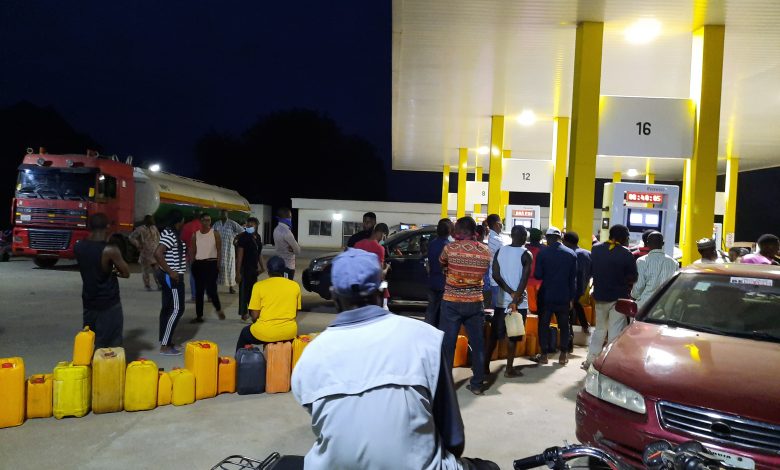COVID-19 Lockdown: Nigerians adopt risky behaviors storing fuel

Anxiety gripped Nigerians as the government announced the lockdown of some parts of the country in its efforts to contain the spread of the coronavirus pandemic also called COVID-19.
On Sunday March 29, President Muhammadu Buhari announced an 11 p.m. curfew to begin the following day. A 14-day lockdown was issued and Nigerians were expected to follow the mandate and abide.
Federal Capital Territory, Lagos and Ogun states are considered critical in the effort.
While the numbers indicate that Lagos has recorded more cases—followed by Abuja—Ogun is regarded as a major gateway in terms of the movement of persons in and out of Lagos.
Since the President’s announcement, state governors have shut down activities in their states for the same reason.
Four hours to the deadline for the commencement of the order, a chaotic atmosphere enveloped the Nigerian National Petroleum Corporation (NNPC) filling station located after the Lugbe Divisional Police Headquarters in Abuja.
Although the president said that “petroleum distribution and retail entities” were exempt from movement restrictions, some retailers ceased their operations before the lockdown.
As a result, stations in operation were met with customers who bought in excess due to their fears of scarcity.
The Total filling station at Corner Shop, Lugbe, was closed and so was the Danmarna station at Kapwa — forcing hoards of motorists to queue at the remaining others, such as Nazeed Glorious Ltd and the NNPC filling station.
Some persons who did not come in vehicles rushed to the stations carrying jerrycans or gas cylinders to get supplies to serve their energy needs during the lockdown period.
A fuel attendant at Total, which is now back in business, later explained that the station ran out of stock at the time.
At the NNPC station, where only one fuel pump was being used to sell, customers lined up over 50 jerrycans, mostly the 25-litre capacity type.
Some jerrycans were placed above others to indicate they belonged to the same person.
Additionally, some motorcyclists joined in the struggle, and at a point 30 cars crammed in the 150 metres between the pumps and the highway.
Some motorists filled their tanks and bought extra petrol in jerrycans, sometimes in up to four containers.
The motorcyclists ensured they received extra stocks by filling up to two large jerrycans, which they tied to the sides of their vehicles by holding them with ropes tied across the passenger’s seat. As a result, the passenger, unable to reach the footpegs, rested his feet on the containers.
In some cases, the motorcyclist placed one container on the tank of the motorcycle and another in front of the passenger — making a total of four.
Unsure about how long the lockdown would last, some Nigerians have bought unusually large quantities of Liquefied Petroleum Gas, commonly known as cooking gas.
Mr. Olasupo Abideen, the Chief Executive Officer of OPAB Gas, a Kwara-based company, told HumAngle that demand for gas shot up about a week before the lockdown.
From selling an average of 50kg in a day, the company started selling 175kg, Abideen said.
He attributed the sudden increase in patronage to the fact that some gas stations shut their facilities and propelled a fear of scarcity to make more money.
Abideen noted that some customers bought more stock than they normally did.
While storing a lot of fuel at home during the lockdown may be economically reasonable, it has safety implications, some stakeholders say.
The Principal Organising Secretary of Nigeria Union of Petroleum and Natural Gas Workers , Alexander Stephen, described the practice as “honestly not advisable.”
Stephen said this was especially as many filling stations and gas plants were open and operating.
He advised those who had excess fuel at home to take safety measures, starting with keeping the items far away from home.
“Whenever we have mediums to talk to the public, we tell them they can access gas when they run out of it at some designated areas within the metropolis.
“Gas itself is not something you can afford to be careless with.
“If you are locking them up in a stuffy place, it is very risky and can lead to an explosion.
“So it’s safer to just get the one you want to use and ensure your gas is always at the back of your kitchen so that if at all there is any hazard it will be minimal compared to when it is inside your house,” Abideen said.
Meanwhile, the Department of Petroleum Resources on Tuesday, March 31, urged oil marketers to continue to distribute petroleum products regardless of the lockdown.
The agency warned filling stations against hoarding products.
The department’s Abuja Zonal Director, Buba Abubakar, also advised Nigerians against stockpiling the volatile products at home.
“Nigerians should not go into panic buying; we are seriously trying to stop people from buying with jerrycans because of the temperature we have today, it is dangerous,” he cautioned.
“There is the availability of products; people are working; sales are ongoing; [and] there is no cause for alarm,” Abubakar said.
Support Our Journalism
There are millions of ordinary people affected by conflict in Africa whose stories are missing in the mainstream media. HumAngle is determined to tell those challenging and under-reported stories, hoping that the people impacted by these conflicts will find the safety and security they deserve.
To ensure that we continue to provide public service coverage, we have a small favour to ask you. We want you to be part of our journalistic endeavour by contributing a token to us.
Your donation will further promote a robust, free, and independent media.
Donate HereStay Closer To The Stories That Matter




